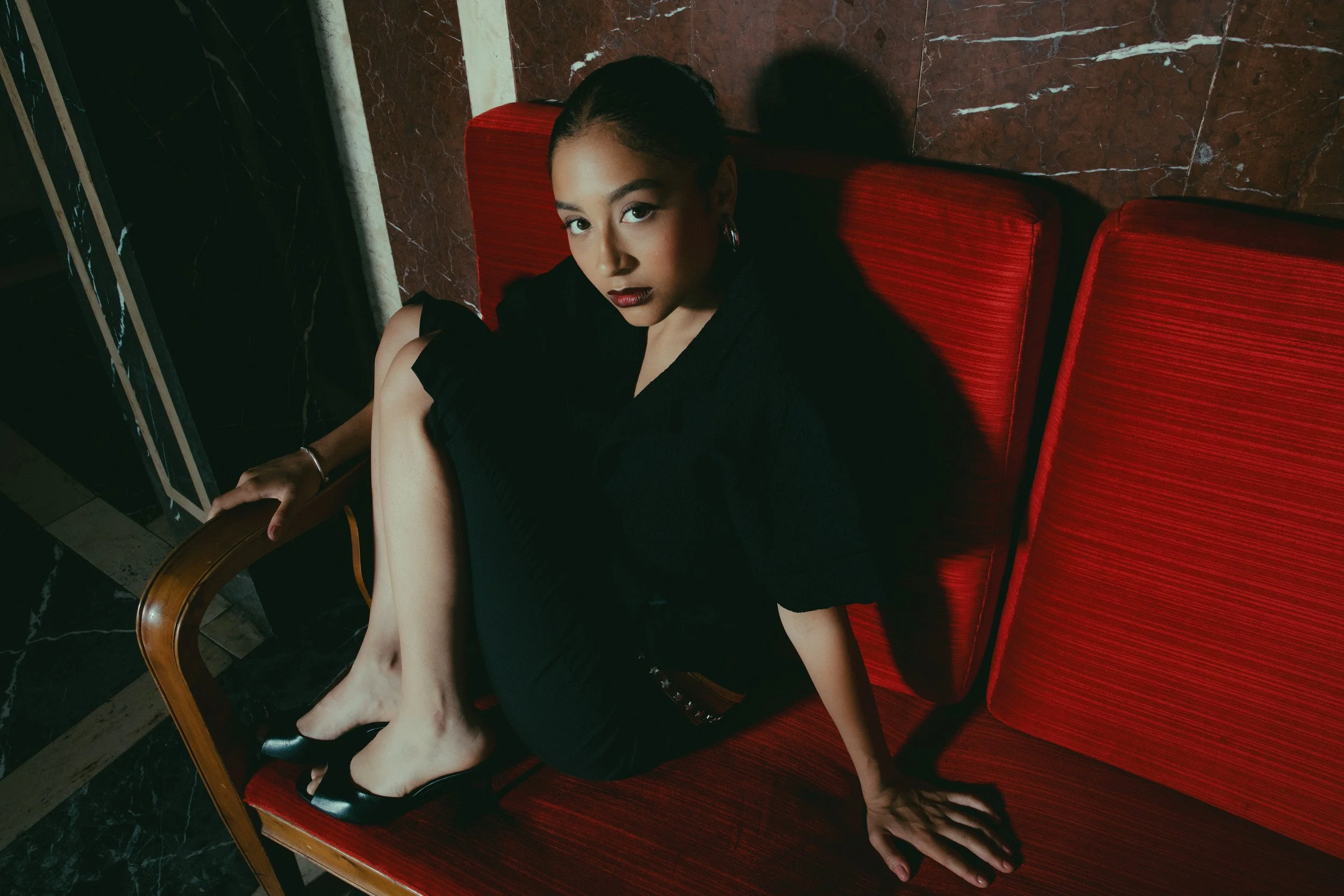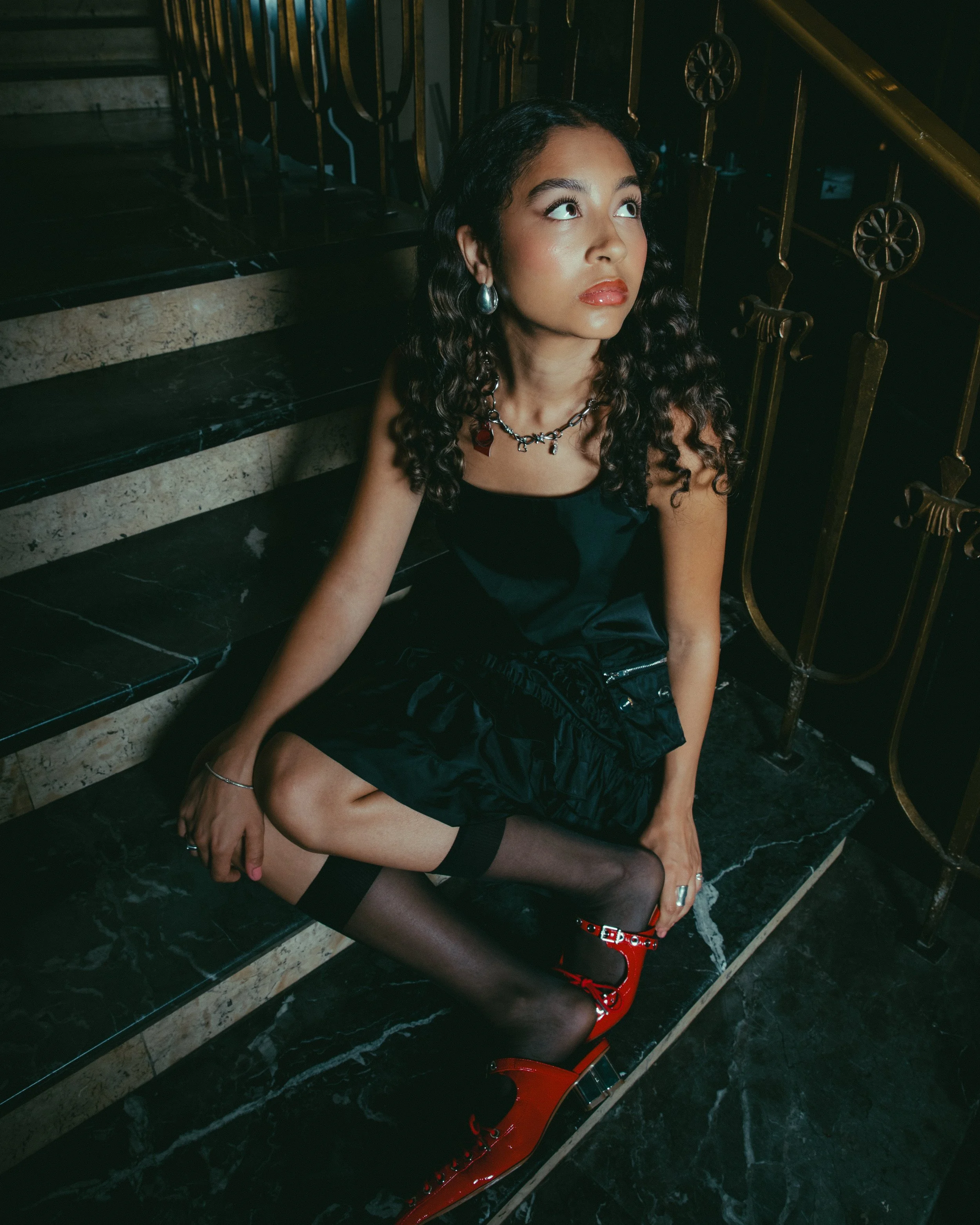Samirah Breuer’s Best of Both Worlds: From Scripts to Study Hall
AFFECT caught up with actress Samirah Breuer, known from Die Discounter, Krank Berlin and most recently Schattenseite. We spoke about her curiosity for complex characters, the fine line between personal experience and performance, and how psychology studies broaden her perspective as an actress. Samirah shared why she builds playlists for her roles, how she navigates expectations as a woman of color in the industry, and why telling stories about mental health on screen is both necessary and powerful.
PHOTOGRAPHER: EBENEZER ABEBE
AFFECT MAGAZINE: Who are you, what do you do, and where do people know you from?
SAMIRAH BREUER: I’m Samirah Breuer, actress. Most people who approach me know me from Die Discounter or Krank Berlin.
A: Describe yourself in three words.
S: Curious, sensitive, and attentive.
A: Do you have a ritual before shooting or performing to get into character?
S: I really enjoy working with music. Usually, I create a playlist for the character already at the casting stage. This playlist then develops throughout the filming process. It’s one of the tools in my toolbox – it helps me connect emotionally and atmospherically with the role.
A: How much of Samirah is in your roles?
S: I don’t play myself, but I do think a lot of me is in the roles. I work with observations – of myself and of others. But of course, those are all subjective impressions. When I build a character, the foundation is often something I’ve experienced or observed. I don’t believe you can only play things you’ve personally lived through, but you need to establish a connection. And it’s exactly in creating that connection that something unique emerges.
A: How do you deal with typecasting? Are there certain roles you often get cast in or reject?
S: If I get the feeling I’m only being cast to tick a quota, I don’t want to do it , it’s not fun on set either. You can tell whether a character was genuinely sought after or if it’s just about checking off a box. I think the industry is evolving, and there are more and more opportunities for POC to tell different stories. But there’s definitely still room for improvement.
A: What makes a “good” role for you?
S: For me, a good role is well written – in a way that makes you feel like you can actually grasp a person. It doesn’t all have to be logical, but it should be consistent within itself. Like in real life: some things don’t make sense, but that’s what makes them human. The most fun is playing complex characters. And I’ve learned to sometimes say no or to address things – to seek dialogue.
A: You’re studying psychology. What drew you to that, and does this knowledge influence your work as an actress?
S: What drew me was that it challenges me on a different level – and still complements acting. I benefit both content-wise in my work and from the daily structure that studying gives me. I didn’t start it for acting, but because I wanted to use my brain in a different setting – to do something academic, where appearance doesn’t matter. Of course, acting isn’t only about looks, but they do play a role. And I didn’t want to depend on that. For me, it’s important not to only live in this one world. That’s why I’m really grateful for my studies.
A: Are there moments on set or in character preparation where you consciously apply psychological concepts?
S: When building a character, it’s helpful to know psychological phenomena – even if it’s not strictly necessary. In Schattenseite, there were situations that reminded me of things from my studies that Nola goes through. That was definitely useful – being familiar with certain concepts and symptoms, and then possibly adding my own elements that fit the same psychological picture.
A: In Schattenseite, suicide is addressed. How much emotional closeness do you allow yourself to a role? Where do you draw boundaries?
S: The hardest moments are often the most instructive. In episode six, I play a key scene that’s very intense – a situation I’ve never experienced myself and that no one close to me has gone through. I had great respect for that day of shooting, prepared intensively, thought about it a lot. But you never know what it’s like to have to summon emotions under time pressure on set. Luckily, I had a strong connection with the director and was able to really let go. That helped me stay open. And I learned what I need in order to work well.
A: How important do you think it is for series to realistically portray difficult social issues like mental health?
S: I think it’s super important. It helps break taboos and challenge clichés. Series can both educate and provide a safe space for those affected. I was recently at the Munich Film Festival, where Schattenseite was screened – along with many other series with young ensembles that deal with mental health. I was really positively surprised at how present this topic currently is, even in the German market.
A: Do you feel that mental illnesses are still taboo in the acting industry?
S: My impression is that people are speaking much more openly – both in front of and behind the camera. More and more people talk openly, more and more films address the subject. It’s no longer just about speaking up if you’re affected yourself, but also about collectively looking for solutions. It is, however, also shocking how little is discussed in other areas or outside the industry.
A: As a young actress, do you sometimes feel pressured to be a “voice of the generation”?
S: Not really. I feel more the pressure – or rather, the responsibility – of being perceived as a voice of a minority. Sometimes you’re the only person in the room representing an entire group. That’s not a negative burden, but it is a special position you’re very aware of.
Interview by Noemi Zak

